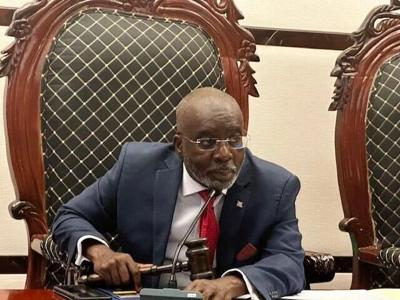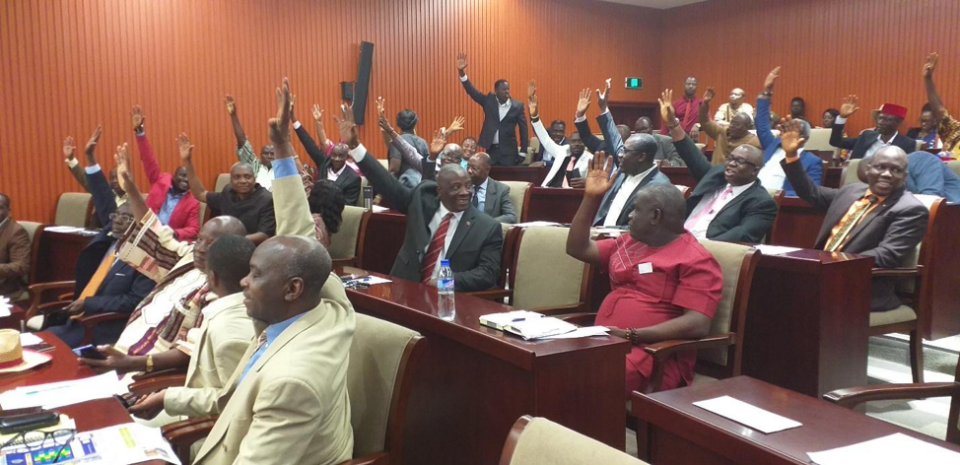By Hun-Bu Tulay
Mobile #: 231777111032/886517356/ Email: nvoma@gmail.com
Chapter 1, Article 3 of the Liberian Constitution emphasizes that “Liberia is a unitary sovereign state divided into counties for administrative purposes.” This founding document establishes a Republic, highlighting the strength of its three distinct yet harmonized branches: the Legislative, Executive, and Judiciary. Each branch embodies the core principles of separation of powers and checks and balances, fulfilling defined roles and responsibilities that ensure a robust democracy.
The Legislative branch thrives on its vital functions: crafting laws, representing the citizenry, and exercising oversight over government actions. The Executive branch, empowered to enforce laws, is led by the president, who serves as a beacon of leadership. The Judiciary, led by the Supreme Court, stands as the guardian of law interpretation. This balance fuels the foundation and stability of a democratic society. The interplay of these branches profoundly influences the essence of democracy, where challenges in one can inspire resilience in the others, showcasing the power of collaboration through mechanisms like the president’s veto or judicial reviews.
Let us delve into the significant influence the Judiciary and Executive have on governmental stability.
Judiciary: The Judiciary embodies a system of courts dedicated to administering justice on behalf of the state. Its role in hearing cases, interpreting laws, and nullifying unjust statutes is fundamental to safeguarding citizens’ rights. A strong Judiciary, operating independently and free from corruption, inspires public trust and cultivates an environment ripe for foreign investment and national progress.
For the populace, the Judiciary often emerges as the most essential branch of government, standing firm against potential abuses from the Legislative and Executive. As the protector of the constitution and defender of fundamental rights, the Judiciary assumes a respected position within the government framework. Citizens’ faith in their Judiciary bolsters overall confidence in the integrity and efficacy of governance.
Yet, it is crucial to recognize that any hint of corruption within the Judiciary can gnaw at public trust, threatening the very structure of governance if not addressed swiftly.
Executive: The Executive dialogue inevitably revolves around the presidency, as the president embodies the Executive Power, serving as the Head of State, Head of Government, and Commander-in-Chief of the Armed Forces of Liberia. The president plays a pivotal role in shaping foreign policy and acts as the Chief Law Enforcement Officer, appointing key ministers and agency heads who work diligently under the president’s guidance.
Challenges arise if the president or their appointees lack the competence or commitment to fulfill their responsibilities effectively. Decisions regarding foreign policy and global engagements significantly impact governmental stability. Historical lessons remind us that missteps, like those of President Tolbert, can lead to profound political transformations. In a world of shifting alliances and rising tensions, diligent navigation of international relationships is paramount to safeguarding the nation’s future.
Furthermore, embracing proactive measures is essential to forestall issues before they escalate. The Minister of Justice or the Foreign Minister should provide legal insights regarding Supreme Court rulings during critical times. Alarmingly, the Ministry of Justice faltered in acting on a bribery complaint reported by a member of the House of Representatives. When this representative reported a bribe of US$14,800.00, the Justice Ministry took no action. The representative sought help from the Liberia Anti-Corruption Commission, which also remained inactive. This perceived inaction from the
Executive branches can compound ongoing challenges, especially since members of the legislature, per Article 42, enjoy certain protections from prosecution unless tied to serious crimes.

This situation prompts essential reflections: Has the inaction of the Ministry of Justice and the Liberia Anti-Corruption Commission unintentionally weakened the Executive? Were political considerations at play? Or does this signal a reluctance to tackle issues until more severe circumstances arise? We must commit to pursuing proactive measures that uphold trust and integrity in governance, ensuring we act responsibly without waiting for tragic events to prompt change.
Conspiracy: Prior to discussing the conspiracy theory, it is important to acknowledge that J. Fonati Koffa inadvertently shot himself in the leg. One notable misstep was his request for support from former President Weah for the 2029 elections, shortly after Weah had announced his intention to step away from politics. Immediately upon the former president’s announcement, he traveled. Upon returning to the country, it appears that former President Weah reconsidered his decision regarding the 2029 elections, following advice from his advisors.
This situation raised questions about how to address Koffa’s position. It was suggested that a strategy be implemented to strengthen the resolve against Koffa, leading to efforts aimed at his removal from the Speakership. The Unity Party recognized an opportunity and sought to capitalize on Koffa’s precarious situation. To enhance their chances of success, the President extended an invitation to Koffa to join him in Rome. While Koffa may have recognized the complexities of the situation, he chose to accept the invitation. Unity Party members believed that had Koffa remained in the country, their ability to secure votes could have been compromised. Ultimately, it became clear that both former President Weah and the Unity Party desired a shift in Koffa’s role.
Justice Minister’s Opinion: In a democratic society, the unique position of the Minister of Justice or the Attorney General is crucial; they hold the ability to challenge the president’s decisions without fear of dismissal, we saw this during President Trump’s first term. As the government’s legal adviser, the minister must provide honest and sound legal counsel, untainted by the desire to cling to their position, a challenge that many African nations face. Historical instances like Justice Grime’s guidance to President King regarding the 1926 Firestone Agreement highlight this truth. Grime cautioned that the contract contravened international law by allowing leases longer than 50 years. Even the Secretary of State of the United States wrote a similar opinion advising Firestone. Ignoring this clear legal advice, President King signed the Firestone Contract, undermining legal integrity.
Moreover, the landmark 1907 case Ditchfield vs. Dossen, delivered by Chief Justice James Jenkins Dossen, established a significant precedent by affirming that the laws of Liberia guarantee equal rights to all citizens, a principle that remained unobserved for decades. Though the ruling wasn’t enforced until the late 1960s, it underscored the law’s potential to challenge systemic injustices.
Our father, who served as a lawyer and Associate Justice before April 12, 1980, often reminded us that judges and legal officials must provide unclouded opinions. If the Ministry of Justice fails to present sound legal reasoning, the citizens will respond. Many may recall Attorney General Cllr. Joseph Jefferson Francis Chesson’s misleading assurance to President Tolbert following the events of April 14, 1979, declaring the country was safe, and a statement that proved tragically misguided.
The consequences of deceit have already affected President Weah, who lost the 2023 presidential election due to the pervasive feelings of betrayal fostered by his administration’s misleading promises. Major initiatives, including the ETON, EBOMAF Financing Agreement, the Bali Island Project, and the staggering USD 50 billion Carbon Deal, have left many Liberians feeling deceived and disillusioned.
Currently, President Boakai appears to be reproducing this cycle of deception. The promised delivery of 285 Yellow Machines remains unfulfilled, leaving citizens waiting and frustrated. Additionally, the NETKOTECH Non-collateral Agreement, which cost many their hard-earned money, is a testament to the government’s failure to deliver on its commitments. Furthermore, the Asset Recovery Team has struggled to convince the public of its effectiveness, especially with the numerous millions allegedly embezzled during the Weah administration that citizens desire to see returned.
The ambitious US$8.4 billion AAID FIVE-YEAR PLAN raises legitimate concerns among the public. The Minister of Finance’s assertions that the government will contribute 30% or US$2.52 billion seem wildly optimistic, considering past projects like Vision 2030, which required $5 billion over 20 years and failed to meet even basic investment targets.
President Boakai must heed the lessons of history. Previous leaders were led astray by those who offered false assurances, leading to disastrous endings. The voice of the people is clear: if they detect dishonesty, their reaction will be swift and severe.
It might be difficult for the government to win many cases if the prosecuting arm of the Ministry of Justice is not SANITIZED, and some sanitization needs to be carried out in the judiciary as well. As it stands, there may be six judges at the Circuit level that need sanitization. All major cases lost by the government at the circuit level were presided over by one of them. What is interesting here is that the government does not appeal if she lost a case in the low court. The High Court is now doing much better, and we pray and hope she continues.
In conclusion: We leave you with a powerful proverb from my village: “The bullet that kills the monkey, the monkey does not hear the sound of the gun when it is fired.” This should serve as a stark reminder of the potential consequences of ignoring the truth in leadership. Honest dialogue and adherence to the law are not merely ideals; they are critical for the future well-being of our nation.

